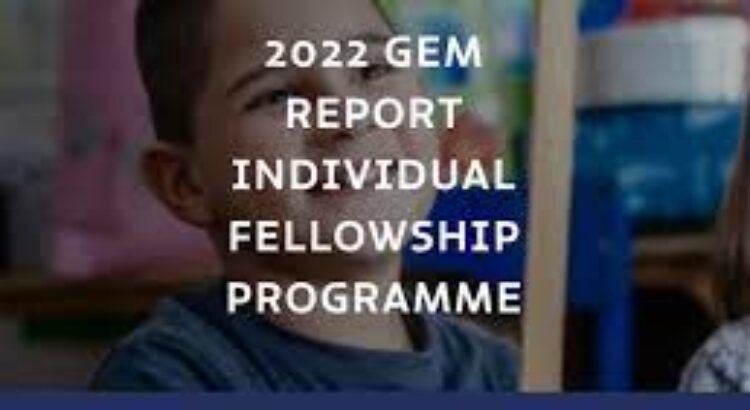The 2022 GEM Report Fellowship offers an opportunity to be part of a select group of scholars and researchers, collaborating with the GEM Report team on one or both aspect of its core objectives:
(1) to monitor and report on progress in the SDG 4 on education and education-related aspects in other SDGs;
(2) to report on the implementation of national and international strategies to help hold all relevant partners to account for their commitments as part of the SDG follow-up and review.

The 2022 Fellowship edition will be the fourth round of the Fellowship programme, adding to a growing, diverse network and community.
Criteria for selection include originality, potential to influence the global education agenda, analytical rigour, feasibility of analysis within the time frame and research that highlights equity and accountability.
The extent to which GEM Report’s data resources are used, such as household and school surveys linked to the World Inequality Database on Education (WIDE) or the GEM Report’s Profiles Enhancing Education Reviews (PEER), is also considered. Submissions that aim to contribute new insights on monitoring indicators, focus on implementation challenges mid-way into the 2030 Agenda, and those that support the themes of forthcoming GEM reports, i.e. the 2023 GEM Report on technology and the 2024 GEM Report on education leadership, will be taken into account.
The deadline for proposals is 1 December 2021. The review process will last for two months, with an expected start date of 1 February 2022.
The GEM Report Fellowship programme, supported by OSF, aims to strengthen the evidence base on comparative and international education and reinforce the links between research, policy, and practice in education. It offers an opportunity to be part of a select group of researchers and scholars who are advancing knowledge in this field, while working with the GEM Report team. The 2022 Fellowship Programme is the fourth round and the new fellows will join this growing community.
Recipients of a fellowship will have the opportunity to work with the GEM Report team’s specialists, one of the world’s leading teams in this field, to conduct research and analysis of education data with a primary focus on SDG 4, the global education goal. The fellowships will help build new skills and deepen the participants’ capacity, while also sharing their experience and knowledge with the team as well as, where possible, with regions and countries. Learning from their experience with the team, the fellows will also be able to participate in and influence the work of the GEM Report.
The work will be carried out remotely, with a two-week-long visit in Paris (with travel allowance) if the sanitary conditions allow. The GEM Report team will provide:
- A stipend (US$19,500) for the duration of the fellowship (up to 11 months).
- A mentor from the team of GEM Report researchers, to provide regular mentoring, guidance and engagement with the GEM Report work.
- Monthly meetings engagement across the research team and Fellows
Examples of work produced and in production by previous fellows are listed here:
2021
– Leena BHATTACHARYA (India): Changes in educational indicators of children in India: Evaluating the Right to Education Act of 2009 (forthcoming)

Fernanda GÁNDARA (Chile): Language considerations for the global monitoring agenda: Insights from a large-scale bilingual assessment of literacy from the DRC (forthcoming)

Emmanuel MANYASA (Kenya): Assessing the impact of ICT integration policy on equity in access to quality education in African contexts: The case of Kenya (forthcoming)

Saba SAEED (Pakistan) and Muhammad AFZAN MUNIR (Pakistan) : Coping with COVID-19 in the Global South using technology: Evidence from Pakistan and Ethiopia on ECE students and the workforce (forthcoming)

Danqing YIN (China): The importance and relevance of home education: Global trends and insights from the United States (forthcoming)

2020
– Elizabeth BUCKNER (United States): The non-state tertiary sector and inequalities in tertiary access and completion
– Nicolas BUCHBINDER (Argentina): Education and ICT in Latin America: Have we been successful in expanding ICT availability and use through education policy? – Wei ZHANG (China): Non-state actors in education: the nature, dynamics and policy implications of private supplementary tutoring (forthcoming)
2019
– Madhuri AGARWAL (India): Retain, promote or support – How to reduce inequality in educational opportunity: evidence from India
– Gabriel BADESCU (Romania): Fostering inclusive education by enhancing cooperative skills
– Donny BAUM (United States): Non-state actors in early childhood education: implications for education equity and quality
– Enrique VALENCIA-LOPEZ (Mexico): Improving and aligning measurement of ethnicity in international surveys
More information on the Fellowship and how to apply can be found here: https://en.unesco.org/gem-report/fellowship







 Users Today : 8
Users Today : 8 Total Users : 35459603
Total Users : 35459603 Views Today : 19
Views Today : 19 Total views : 3417991
Total views : 3417991